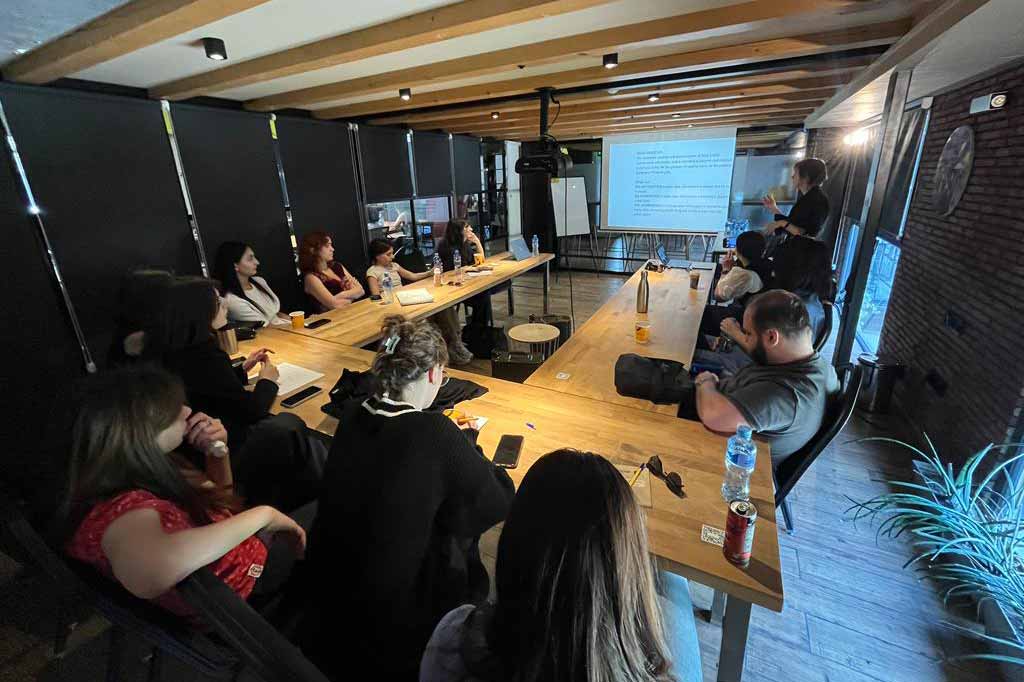Journalists Sharpen Reporting Skills
Armenian, Azerbaijani and Georgian reporters delve into often overlooked topics at IWPR workshop.
Journalists Sharpen Reporting Skills
Armenian, Azerbaijani and Georgian reporters delve into often overlooked topics at IWPR workshop.
Georgia-based journalists had the opportunity to sharpen their journalism skills in pitching, long-form reporting and environmental and gender issues at a two-day IWPR seminar in Tbilisi.
The event, organised within the Amplify, Verify, Engage (AVE) project, brought together 13 Armenian, Azerbaijani and Georgian reporters, who delved into often overlooked topics.
George Lomsadze, a Tbilisi-based journalist with over 20 years of experience of covering the South Caucasus for international media, ran an interactive session on how to craft attention-grabbing pitches and build feature stories and long reads.
“How journalist pitch their ideas is critical to getting them published; excellent and significant stories can never see the light if the pitch is weak,” Lomsadze explained. “Similarly, mastering the various reporting styles is key for keeping channels open with publications. Long reads are part of a process that starts with grasping the basic reporting tools and applying them to more layered stories, it is a building block process.”
Participants were particularly interested in this form of in-depth, narrative journalism.
Tbilisi-based Azerbaijani reporter Sabina Abukirova said she would like to expand in that form because “it affects readers on deeper level,” while Georgian journalist Elene Burchuladze highlighted “the importance of the narrative that can bring a feature to life, making it visually compelling”.
Manana Kochladze, director of one of Georgia’s largest environmental NGOs, held a session about the region’s most pressing issues.
“Raising awareness on the problems affecting the environment is key as they define our daily life in ways most people do not realise,” she explained. “For example a drop in the bees population as a result of pollution means fewer crops hence less food, while water scarcity impact agriculture yields and it can trigger conflict among communities.”
She stressed that it was critical for reporters to carry out intensive research.
“What is visible, say a landslide or noticeable pollution in a river, is easier to cover; the challenge lies in covering what is not apparent, in going to the roots of the problems.”

IWPR Eurasia editor Monica Ellena focused on the impact of gender stereotypes, detailing how social norms and unconscious bias penetrate journalism and influence society.
“I discovered my unconscious bias in my own reporting,” Lana Kokaia, a reporter with Radio Free Europe’s Georgian service, Radio Tavisupleba, explained. “The sessions illustrated why gender-sensitive reporting matters and how we can write powerful and gender-balanced stories.”
The seminar highlighted how issues can deeply interconnect, which Burchuladze said prompted her the idea to research eco-feminism in Georgia and report on “small acts of bravery driving change.”
“The training was incredibly useful for our organisation, covering topics that are highly relevant for us and our audience [the Armenian community in Georgia],” said Liza Torosyan, editor-in-chief of Aliq Media Georgia, an independent Armenian-language multimedia outlet. “The session on environmental issues in Georgia was enlightening, enabling us to gain deeper insights into the challenges our region faces and how we can contribute to finding sustainable solutions. Similarly, gender disinformation holds significant relevance as we recognise the need to address gender-based misinformation and its potential impact on communities.”
Salome Mukhradze, AVE programme manager, said that the topics were identified due to the limited capacity among the media community to cover increasingly critical issues like climate change and gendered disinformation.
“Journalists in the South Caucasus have a very general knowledge of the issues, largely limited to cover them when specific events develop, for example flooding or protests," Mukhradze explained. “The idea was to provide them with the tools to go beyond the breaking news and refine their research abilities."
This publication was prepared under the "Amplify, Verify, Engage (AVE) Project" implemented with the financial support of the Ministry of Foreign Affairs, Norway.
